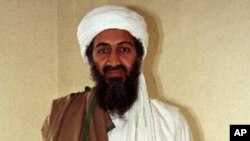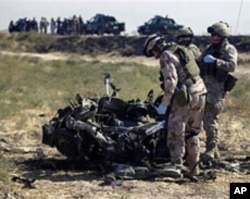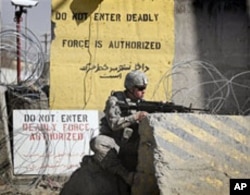The NATO-led international military force in Afghanistan is fighting the Taliban insurgency and is hunting down al-Qaida militants. In this report from Washington, VOA Senior Correspondent André de Nesnera looks at what impact - if any - the killing of al-Qaida leader Osama bin Laden will have on the NATO mission in general and the situation in Afghanistan in particular.
NATO has been operating in Afghanistan since 2003. The alliance has more than 130,000 troops as part of a United Nations mandated contingent known as the “International Security Assistance Force” - or ISAF.
Alliance's objectives
Analysts say NATO has three objectives in Afghanistan. The first is to assist the Afghan government in its efforts to rebuild and stabilize the country. The second is to train the Afghan army and police. And the third is to hunt down and eliminate insurgents in southern Afghanistan - home of the Taliban, ousted from power by a U.S.-led coalition in 2001.
The United States is the largest contributor to ISAF with approximately 90,000 troops. Additional American soldiers and Marines are part of “Operation Enduring Freedom” whose goal is to hunt down al-Qaida terrorists.
Charles Kupchan is a NATO expert with the Council on Foreign Relations. “The bulk of the search for the terrorists that have been operating, the more hardened terrorists if you will, al-Qaida related troops coming across the [Pakistani] border, that has been carried out more by the United States than by NATO as a collective entity. But different countries within the alliance have participated in counterterrorist operations on an ad hoc basis,” he said.
Constanze Stelzenmueller from the German Marshall Fund of the United States says some NATO forces did indeed participate in counterterrorist activities.
“For a while, at least, other allied Special Forces were involved in the search for al-Qaida operatives, at least in the south of Afghanistan. It is quite well known that the British were among those - it is slightly less well known that there were German Special Forces among them for a while,” said Stelzenmueller.
End of bin Laden hunt
For almost a decade, intelligence agencies led by the United States had been trying to locate al-Qaida leader Osama bin Laden. That search came to an end a few days ago, when U.S. Special Forces killed him in a heavily fortified compound in the Pakistani town of Abbottabad.
Sean Kay of Ohio Wesleyan University says bin Laden’s death poses a serious question. “I do think that there will be a very legitimate debate now here in this country about why are we still in Afghanistan now that bin Laden is dead,” said Kay.
Call for quicker withdrawal
The United States is expected to begin withdrawing its troops from Afghanistan this July. And all international combat forces are expected to leave the country by 2014 - conditions permitting. However, some forces may remain in the country past the 2014 date.
Some U.S. and European lawmakers are beginning to call for a quicker military withdrawal from Afghanistan.
“That’s a populist temptation that is understandable but ought to be resisted because it would be irresponsible to do so," said Constanze Stelzenmueller. "It is not in anybody’s interest for the West to withdraw and for Afghanistan to implode once more and to become yet another potential host and staging post for terrorist groups.”
For Charles Kupchan, bin Laden’s death will fuel a different debate. “The successful mission to take out bin Laden will strengthen the voices of those who argue that the United States should be spending more time going after discreet [terrorist] cells, whether in Pakistan, Afghanistan, Somalia, Sudan, wherever they may be - and perhaps somewhat less effort on the counterinsurgency front in Afghanistan. That debate, my guess, will be fueled by the successful elimination of bin Laden. Where the debate comes out is anybody’s guess,” he said.
'Positive effect'
Brian Jenkins is an expert on terrorism with the RAND Corporation. He sees Osama bin Laden’s death as having a positive effect on some members of the Taliban since it is not a monolithic force.
“The Taliban, actually, comprises many different components and networks and they don’t always agree. Some are very close to al-Qaida’s ideology, al-Qaida’s view of the world," said Jenkins. "Others are more distant and for those, they may regard the death of bin-Laden as a positive development - that is for those Taliban members who wish to engage in some sort of dialogue [with the Afghan government] that may ultimately lead to a resolution of the conflict and participation in some fashion in government, al-Qaida was a burden that they had to rid themselves of.”
Jenkins and others believe al-Qaida’s ideology has become irrelevant given the current unrest in North Africa and the Middle East - known as the “Arab Spring.” But experts warn with the death of bin-Laden, al-Qaida will have to prove to its followers that it is still in business and that al-Qaida has not died with bin Laden.






